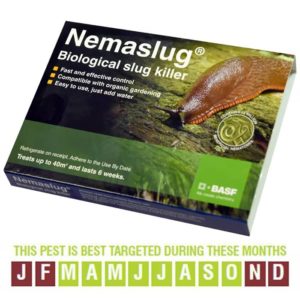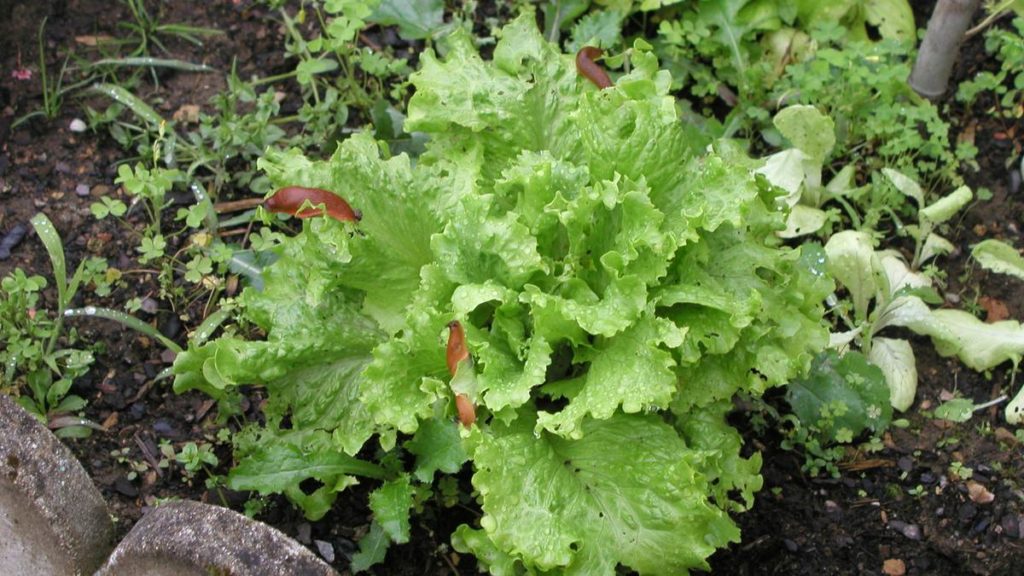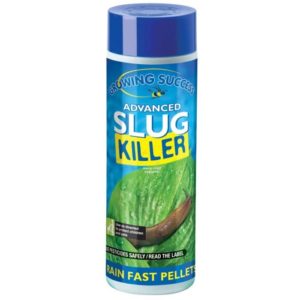The main constituent in conventional slug pellets, metaldehyde, is to be banned in 2020 announced Michael Gove, Secretary of State for the Environment. The reason cited is an unacceptable risk to wildlife. Metaldehyde based slug pellets will be withdrawn from sale in 6 months.
It will be legal to use metaldehyde based pellets after 2020 under cover – basically polytunnel growing farmers, presumably with a licence to use pesticides.
Risk with Metaldehyde Pellets
There is a risk with metaldehyde based pellets of poisoning pets and children who directly eat them although this is extremely unlikely if they’re properly applied – i.e. scattered thinly. Dumping slug pellets in piles is dangerous and ineffective.
The risk to wildlife is that they eat the dead slugs who remain on the surface and are poisoned by the metaldehyde in the slug corpse. Although this has been cited as a risk for many years – which is why metaldehyde is banned under organic standards, I believe it is actually an extremely low risk with few actual cases. Still, I could well be wrong. Incidentally, the ban is only in the UK – not the EU and USA etc.
Metaldehyde and metaldehyde based pellets have been used to control slugs for the last 80 years – so to many gardeners they are the go-to slug control. Happily there are now good alternatives.
Alternative Slug Control Methods
One of the most effective slug controllers are ducks. They love them! But if you don’t have ducks that’s not much use to you. Ducks & chickens tend to devastate vegetable crops too.. not the ideal solution on the plot. Chickens will often ignore slugs, I assume they don’t like the taste.
RHS Trial of Alternative Slug Controls
The RHS undertook a study of five popular organic home slug control methods and found them to not be effective.
Copper tape, horticultural grit, pine bark mulch, wool pellets and egg shells were all shown to make no difference when applied to lettuce, with gastropods inflicting the same damage to those treated with the remedies as without.
Traps & Trapping
Beer traps etc. will catch slugs as will heading out at night with a torch when the devils are active to pick them. The problem is the ones that get away. In a small area you can make a real difference although more will head in to fill the void so an unpleasant task you just have to repeat frequently to keep on top of them.
Nematodes
 Nematodes (sold as Nemaslug) can be the most effective solution. Nematode controls are very small worms that infest and kill the slugs and only the slugs. Other creatures are unaffected and the environment isn’t harmed but there are some drawbacks to nematodes as a control.
Nematodes (sold as Nemaslug) can be the most effective solution. Nematode controls are very small worms that infest and kill the slugs and only the slugs. Other creatures are unaffected and the environment isn’t harmed but there are some drawbacks to nematodes as a control.
- First problem is cost. They’re not a cheap solution and repeat treatments may be needed during the season.
- Secondly the conditions have to be right, if it’s too cold they won’t work. They don’t much like heavy soils either.
With the right conditions though, nematodes are very effective, possibly the most effective solution to slugs.
Ferrous Phosphate Pellets
The ferrous phosphate based pellets are my preferred slug control method. They work just as well if not better than metaldehyde pellets but in a different way. Metaldehyde causes the slugs to dehydrate leaving the trails of slime and dead bodies on the surface. Ferrous phosphate stops them eating so the slug goes back underground to die.
Because the bodies aren’t visible, some doubt their effectiveness but, trust me, they do the business. Some years back we visited a friend in the Limousin (France). Despite barriers, traps and night hunts her major problem was large brown slugs, dozens of the devils. As fast as things were growing, the slugs were munching them up. You can see three of them on one lettuce! I asked why she didn’t use pellets and the answer was that she didn’t want to harm the frogs and hedgehogs, not to mention her four cats.
The first application had vanished the next morning and the number of slugs reduced. A second application also vanished over a couple of days and so did the remaining slugs.
Ferrous phosphate pellets are a little more expensive than metaldehyde based pellets but, used properly (scattered thinly), the difference in price is negligible on a garden scale. Since they’ll have to ramp up production to fill the void when metaldehyde pellets are withdrawn, I expect the price to fall a little in the long term.
Uneaten pellets eventually degrade into their constituents which are basically a fertiliser.
I know of two brands. Growing Success Advanced Slug Pellets and Neudorff’s Sluggo Slug & Snail Killer which comes in a standard and ultra type. The ultra type is stronger and so you need to apply less.






as a user of metaldenhyde pellets with good results I am in favour of the proposed ban if it includes all and not just the small minority basically if your going to ban it that must include farmers and growers with no exclusions no get out of jail cards under the umbrella of pesticides licence because a majority of metaldenyde pellets are used by growers and farmers on open cultivation crops of rape and brassicas crops and others and not the home gardener
I believe on the hole home gardeners are aware of the dangers to wildlife of using methaldenhyde pellets and use them responsibly I only use methaldenhyde pellets on netted raised beds not on open planted ground
now having said all that I will be the first to use ferrouse phosphate slug pellets because it been said phosphate pellets do the job as well as the methaldenhyde pellets so its going to be shop around to find the best price for Phosphate pellets next year
mind you Gove mite be out of a job or sacked next year who knows
I reckon the ferrous phosphate pellets actually work better and the price has fallen to near the same. I use about half a pack at most in a season so a few pence isn’t a problem.
what did farmers and growers use before Metaldehyde slug pellets?
No idea. Arsenic? Lead & Mercury? Some of the things the Victorians sprayed around are terrifying.
The main commercial product going back decades was a Murphy product called Slugit, which was a high volume liquid spray to cover the crops. It did a magnificent job and in those days nobody thought about the Environment, product control was more about health and safety for the person applying it and lead times for product consumption. It eliminated all slugs with one application.
a little bit more info John how long do the ferrous phosphate pellets last after a rainfall as the Metaldenhyde pellets seem to disappear when it rains
and as you say the ferrous pellets last longer therefore it must be adding more protection for brassicas crops do you find its best to spread the pellets round each plant or scatter all over the brassicas bed or put them in a waterproof tray or dish?
Hi Rowland
Once the slug population is reduced, the remaining pellets seem to last quite a while, certainly longer than meta. Not that we get much rain here 🙂
Follow the instructions on the pack and spread them thinly and as evenly as you can on the bed. They attract the slugs to them. You should use meta like that too.
I think the ban is a step in the right direction. My husband and I are both vegetable & ornamental growers and have endured the grizzly task of night time slug/snail hunting. However we recently came across an old recipe of using bran in a pot. It’s irresistible to the gastropods that they sniff it out eat their fill then dry out whilst remaining edible to hedgehogs , blackbirds etc.
Hi Donna
can I ask do you put the bran in a pot and cover it keeping it dry not letting it get wet and does bran last a some time or do you need fresh bran top up I’m thinking of trying this method out on our raised beds
would packet bran flakes do the job?
I like the bran suggestion as the natural predators will still be fed at a time when rearing brood. However one would have to take action against rodents which is not impossible but could be difficult to perfect.
I’ve seen homemade garlic spray recommended on a couple of TV gardening programmes and it was recommended on GQT a few weeks ago. I’ve been using it for several years. Works better in the polytunnel than outside. I live in Cornwall and the regular rain washes it off outdoor plants (I assume)
To make it, boil up some crushed garlic in a sauce pan for about thirty minutes. Strain and transfer the liquid into a spray bottle. Tony
@Rowland Wells
Try doing an internet search for watermills, windmills, or other small millers. I’m sure they would sell you a sack of bran at a very low price. I would telephone ahead. Not all small millers have the equipment to separate the bran.
It’s good it’s being banned at last, although I’ve always been suspicious of it; if it can harm our children or pets surely by the time we are elderly it may be harming us.
So for that reason I have been using the alternative ferrous pellets on my plots and garden for many years.
However, I must advocate also the Grazers product for slugs and snails which works extremely well as do the rest of their calcium based preventative products if used in accordance with the instructions.
Pleased to see the ban on the metaldehyde pellets. However, I’ve been using the Ferric Phosphate product for many years now, but was concerned to read that the chelating agent they also contain (EDTA) might be a problem for earthworms. It’s possible that not all formulations contain this, but they don’t list is as an active ingredient so it’s hard to tell.
http://gardenprofessors.com/upon-further-reviewiron-phosphate-for-slugs-and-snails/
Hi Tracey – there’a a couple of US sites claiming Ferrous Phosphate pellets kill pets and worms. Quite why Americans keep feeding their dogs on slug pellets is beyond me. However, I have contacted Neudorff who confirm that Sluggo® Slug & Snail Killer (trade name “Ferramol” in other countries) does not contain EDTAs.
They also told me “All of Neudorff’s mollusicidal products have been studied extensively by European authorities. According to the current EU rules and criteria, they do not pose a risk to human beings, pets or the environment. In addition Neudorff also received the Ecocert certification, which confirms that all these products are allowed to be used in organic farming (certificates attached)”
I haven’t spoken with Growing Success but they’ll have the same or equivalent certification or they wouldn’t be on the shelves here.
with reference to Hens not liking slugs….wherever have you got this info. Have 3 girls who have been on slug duty in my garden over winter. They love them and the eggs. wish I could take them to my plot. They have cleared my garden of slugs….and plants lol, now confined to quarters
Deb – my ladies just ignored a couple of slugs who were sliming across their treats bowl! I’m actually becoming convinced that hens can be spoiled 🙂
Having had a successful career as a professional gardener as well as an allotment holder, I am pleased to say that I have never used ‘cides of any kind. Wildlife has always been encouraged to flourish and I have always grown enough food to satisfy us all. A healthy soil community coupled with suitable companion planting allows for a natural balance and provides a mutual benefit. The old trick of planting diversion plants like hostas and calendula among the lettuces and cabbages, and veering away from regimental monoculture works well, as does planting plenty of shrubs around the place to provide nesting places and cover for predators as well as providing cover for hedgehogs and grass snakes. As Walter Gabriel used to say : the answer lies in the soil, but also in the natural web of life. No need for chemicals at all. Snails and slugs are part of the food chain. Please don’t destroy it.
farmers use metaldehyde slug pellets as they are very effective cheap and prevent literally £10s or perhaps £100s of millions of crop damage. Farmers are responsible and minimise usage just as on allotments, but with bigger plots. Large scale wildlife monitoring has been undertaken for decades yet despite all the wishful thinking and wondering about everything farmers might be doing wrong to the environment, as usual there appears to be no evidence of any significant harm to wildlife.
If you think back to when there were no chemicals, then you can think back to times of crop failure, the potato famine and starvation and that is the hard truth about agriculture. If you live in an affluent society you can choose to buy expensive low cropping organic food from a country area that cannot effectively feed itself and increases expensive imports to pander itself by flying trays of baby beans and snap peas from Africa, lucky you. If you live in a poorer society you will probably be very happy to take the full advantage of increased crop yields and lower prices through modern effective agricultural techniques including effective pest control.
A governmental ban on any potentially harmful agrochemical should be based on its measured impact and toxicity through effective studies. If it has not been shown to have any significant impact after substantial decades, like slug pellets, then there is no clear basis for it to be removal other than it panders to doomsters. An enforced change based on a subjective whim or listening to urban myths is not effective decision making. Likewise simply enforcing an alternative is simply not logical.
Think about it, almost everything is bad for something, somewhere, but it really helps to get the real facts and to put things in perspective. Have you seen any real, scientific evidence of poisoning to any hedgehogs? just look at the available information and reports. Having eaten a few pellets then dying of age or disease does not prove poisoning any more than a human eating a peppermint and dying from a stroke; and yes peppermint oil can be toxic.
Slug pellets are dry, smell unpleasant to most and are bright blue and I understand some companies put Bitrex in. Hedgehogs prefer soft chewy slugs. The potentially 50% change of a lethal dose for a large hedgehog may be in the order of 1000s. Is a hedgehog really likely to be so indiscriminate it will willingly eat thousands of these even if it could find them in one sitting. The lack of any supporting slug pellet related hedgehog deaths has been admitted on at least one of the better Hedgehog related sites.
I have an allotment, have been keen on wildlife my whole life and do actually, actively look at the available facts because I am interested in truth. If you have an allotment or garden, are happy having lettuces and cabbages be decimated by slugs and snails, potatoes holed and seedlings disappearing while you play with beer traps, sand, soot, copper strips, night hunts with a torch, or nematodes at £20 a go then that’s your choice, but this is play gardening. You will be buying the rest of your fruit it and veg from the supermarket.– and who grows that for you
I use a minimum of any agrochemicals but nematodes are not economical, cannot be seen to be doing anything and are reported to not even be effective on clay. If I grow crops I want them to be successful, If I can’t grow them effectively or economically then I change crops or occasionally use effective pest treatment. I am not growing crops to feed pests. Sacrificial plants, great idea ! I can sacrifice my potential crop area to sustain and increase a pest population. Is there anything more tasty than a sweetheart cabbage? Yes probably my next one !
If you want to apply a doubting and negative philosohy to life then you might doubt consulting your doctor as you could literally be poisoning yourself. In perspective find the toxic dosage for paracetamol for an adult, you should be shocked. Read the side effects of medicines you have been prescribed and have bought yourself; more than worrying surely? They should all be banned perhaps? Cortisones, penicillins all really bad perhaps !